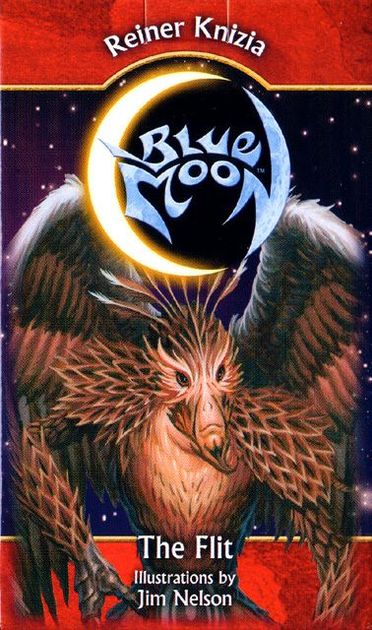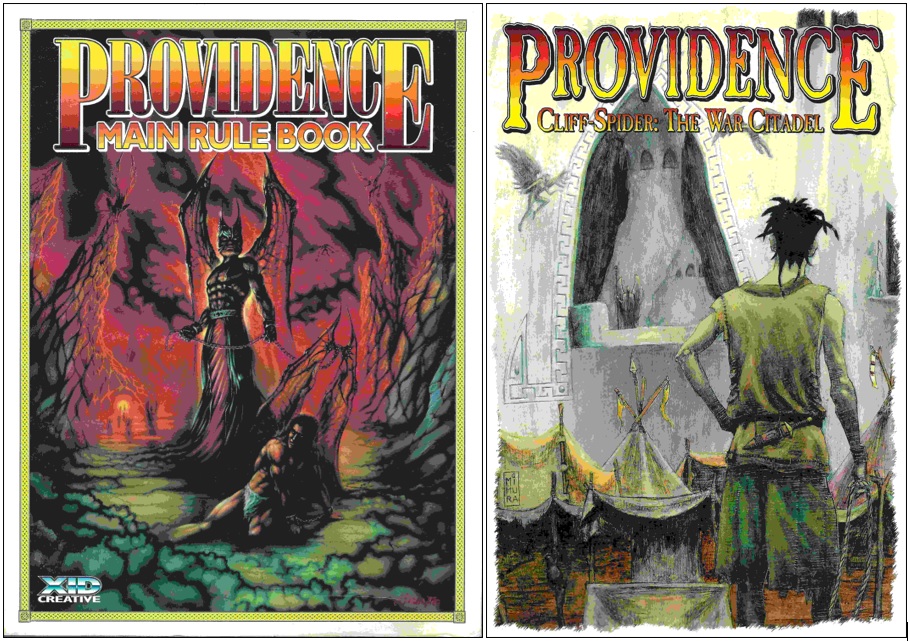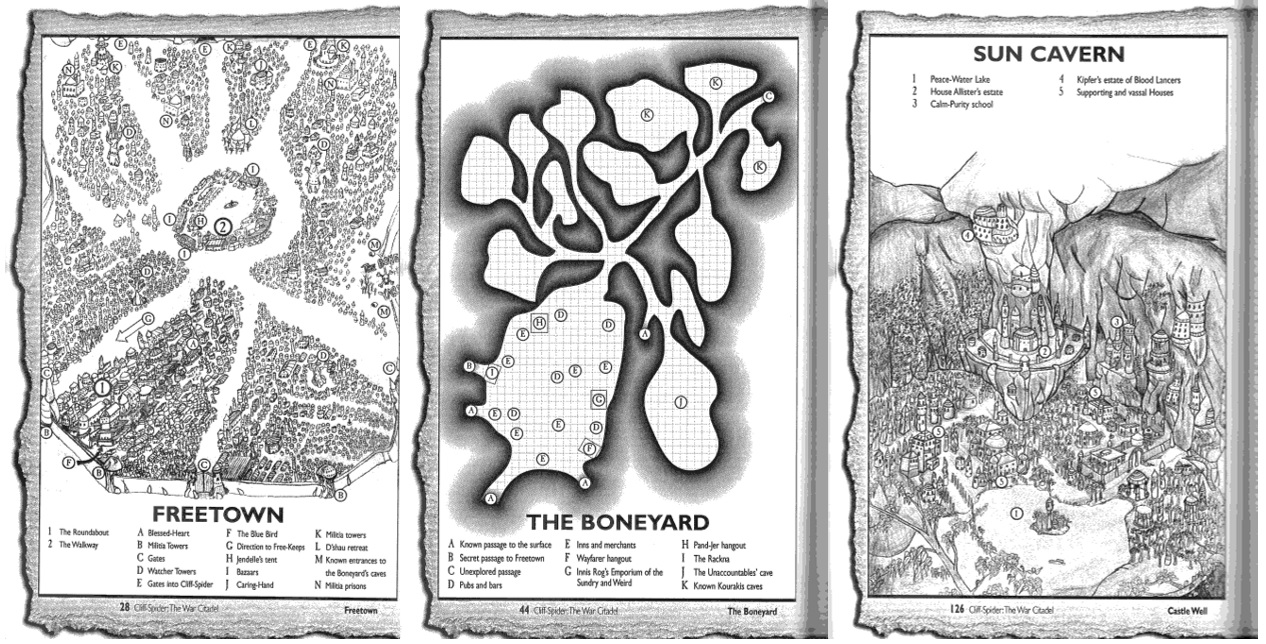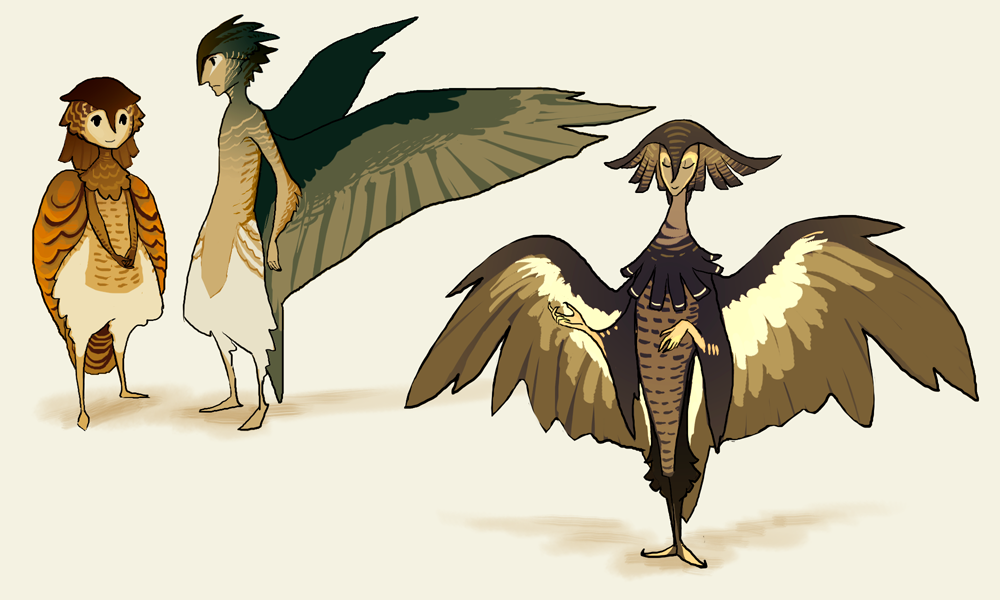Our game of The Pool continues, following the events of the great galactic peace meeting as seen in Galactic peace Pool. Here’s what we decided to do: to play each of the three established player-characters back at his, her, or its home-world, afterwards. In each case, the other players will make up new characters for that people/species, and we’ll play through for each one before starting a new one.
Right now, we’re three sessions into our time with (story? investigation of?) the Avix, featuring Qixakol of course, and adding Jerry’s Karnovix and Renee’s Hibou. Here are the characters as provided to me, and here’s my preparation after receiving them.
 Visualizing the Avix during play isn’t difficult, but it’s not easy to find good references beyond the initial picture chosen for Qixakol. Bird-people fall into well-established tropes that don’t quite match this facially shape-shifting, beautiful but somewhat disturbing concept. I like the cartoon pic above quite a lot, but for most of the references, especially Karnovix and Hibou in the documents, we all acknowledge that they are not “bird-headed,” but that whatever we imagine as their heads and face invoke the birds in the pictures without being literal. (editing this in: I realized after a while that I was also personally referencing the Flit in the duelling game Blue Moon)
Visualizing the Avix during play isn’t difficult, but it’s not easy to find good references beyond the initial picture chosen for Qixakol. Bird-people fall into well-established tropes that don’t quite match this facially shape-shifting, beautiful but somewhat disturbing concept. I like the cartoon pic above quite a lot, but for most of the references, especially Karnovix and Hibou in the documents, we all acknowledge that they are not “bird-headed,” but that whatever we imagine as their heads and face invoke the birds in the pictures without being literal. (editing this in: I realized after a while that I was also personally referencing the Flit in the duelling game Blue Moon)
I developed my concept of the home-society based on the three characters, including references to a hierarchical, ritualistic culture, and especially Jerry’s introduction of a flightless underclass. Helma clarified to us that the Avix had been quite comfortable with ethnic cleansing of planet after planet, hundreds of them over the past generation, for purposes of moving in and living on them, which is the policy they’ve ceased as of the peace … and are not especially culturally clear about what that will entail for them. Since I’m specifically not trying to be cute or clever, I went with “towers” with the flight-capable avix living up high in them, over the cloud cover, and the flightless living at ground level around the base of each one.

In need of usable local maps, that led me to a 1990s game on my shelf called Providence, which relied on similar tropes. The “Cliff-Spider” supplement provided some good ones for us, as it features a tower/fortress dominating a rough-and-tumble city beneath it.


I’ve attached my preparation notes below. We’re three sessions in now, and one of our considerations is to keep the words flowing into the character stories, and to mind what new traits are brought in this way. I can say that finally, I am able to enjoy the power of this system, which really is a lot more about the addition of words and identification of traits, far more so than the bonuses assigned to the traits or to monologues during play. Getting obsessed with the latter things is something I’m going to warn against, in general. They are fantastic toward the ends or “point” of what gets put down onto the sheet at the end of the session, but not as ends in themselves.
As of this post, I’ve included videos for sessions 5 and 6, the latter being shortened by a connection problem. There’s no missed play, though, as we didn’t continue the session, instead picking up with session 7, which I’m editing right now. (edit: added!)
All thoughts and questions are welcome!





13 responses to “Galactic Peace: the Avix”
… or to monologues during
I experienced something in our last Pool session which may or may not be related to this, I am playing with Rod and Jon and Rod is the GM. I failed at a conflict and the situation changed based on that. A more dangerous (I think) situation stepped through door of my failure and I found that way more interesting than my success would have been. OR at least that was my perception.
I will be honest, I am not sure what to make of it other than it seems like a good thing? Maybe my perception of what I can do with conflict / MOV is still evolving (I mean it is for sure). And whether either Jon or Rod that it was significant, I cannot say. But it stood out to me as something you do not get in many other systesms.
The real question is, why is
The real question is, why is it not default that any played event using procedures affects the current scene irrevocably, and if the scene's contents are relevant, the encompassing situation as well?
I'm not talking about The Pool, or rather, I point yet again to the fact that seeing X or Y or Z in The Pool, whether "hey, that works" or "my god, that is broken," is less about The Pool than about oneself. It is a signal to examine views, assumptions, familiarities, and history.
Last Thursday's course session addressed this issue, and especially opened the topic you're mentioning here. I even tagged it as the big lesson I've learned from the past few months of playing the game: the GM must play #4 to be different from #1.
But again, not because this is a feature of The Pool as such, but rather, failing to do it when playing The Pool cannot be glossed over or retconned or massaged – your own bad play is staring you in the face. What I'm pointing to most strongly in your comment is that when Rod, as I see it most rightly, does play #4 as having been changed by the procedures, you notice it as "different." I ask again, especially for a game in which a single roll includes a substantial chunk of fictional content, why is this not appropriately recognized as the necessary default?
As an associated point, when this is occurring, the rolling at all means that characters are effective in the sense of doing things which make a difference of some kind, and that players are present in play, in the sense of individuals who stated distinctive things rather than place-holders in generic player slots. The point is that success or failure of the roll is not the determinant of characters mattering or players being present. You are not rolling "for" your character to be important or for yourself to be present; these things are not at risk.
The following topic is not my particular failing during play, but it seems to be widespread enough to merit attention as well: the concept of "failing forward," whatever its originator in RPG parlance may have meant, is now evident as an abomination. It means that #4 is treated as whatever gets the group to whatever is perceived as the story, or most fun, or OK after all. The play-effect is to render the rolls into colorful speed bumps with no actual constraint laid down upon what #4 is going to be. (See the discussion in Neck and neck, including rules text from Väsen.)
the pen is mightier than the sword
How much fun I have playing this game right now. There are a couple of factors why that is the case and if you want to see them in play and don't have much time, I recomment our last session (session 7). The whole experience has been that of playing with multiple moonballs in a closed room – look them up if you've never seen one, they give bounce a whole new meaning. What made the last session so great for me was that it had all the aspects of great play. A ball that started rolling 2 sessions ago and finally dropped, a sequence of play based on listening to each other and building on what is said and a roll necessitated out of “desperation” and “anger” (character not player!) and resulted in a success and MOV in which I'm still not sure whether I threw a ball or a bomb at everybody else. I guess we'll find out soon. Also, suspicions and secret agendas all over the place. It is now that my character has decided to become an active part of what is going on – or maybe she just finally understood that she always was and takes it to the next level?
I decided it may be interesting for others to share the proces of building her “story” as far as I could recall it. For Quixakol, so far, the words I put down have had a strong influence – whether they became traits or not and independently of any bonuses that might be attached – and for me it has been fun to see the text grow as this is the first game where I do this kind of continual writing of a characters story, hers has grown from 50 to 155 words now. [File: Text development for Qixakol]
I'm really looking forward to see how this will look for the other characters from the Galactic Peace Conference when we continue play on other planets.
Before I go to bed I just
Before I go to bed I just want to say thanks for that character document!! I have dreamed about exactly this kind of description of the character story-making process, in increments, from the player's perpective.
I have just begun watching session 6. This whole SF Pool game, the players's decisions, the prep notes, the thinking about events and play in arrows #1 to #4, the mid-play shift to a different separate-but-not-separate situation (planet), is so good for me. And it's so fun to watch.
Thanks for your kind words
Thanks for your kind words Love, happy you found the dokument interesting. Writing a little note to myself in addition to the 15 words after each session helped me too. Ron asked us to add a final 15 words after the conclusion of the ark, so in the end the text was 200 words. What I find especially nice about the experience is how much more meaningsful the characters backstory became (for me) by not writing it before play started or some session in, but to continually add to it and let it be a part of the things that define the character and her actions in play. I've never been one to write a journal or diary but this was actually fun.
As we have finished play now I thought it might be fun for you to see the final dokument.
Session 8!
Less abstractly, Olmac and Qixakol arrive at where they can be perceived to be headed all along. Two warnings: (i) violence + feels, (ii) poor sound recording for network input, so that several people's dialogue gets more and more underwater-sounding as the session continues.
Here is the link directly to the session inside the playlist.
Session 9!
Here it is! Now with real sound (the last few recordings suffered from mismatched program updates).
It leads to very simple preparation materials as you can see, although that also relies on having already established a lot of physical and social context. Basically, knowing that Qixakol and Karnovix are in a desperate aerial struggle ("immediate logistics" in my notes) and that Hibou is in imminent danger of being fed to the mutants in the scary caves is enough preparation in terms of what to do. It's easy to forget about #2, though, especially since events in the previous session delivered an immediate shock throughout all concerned persons and institutions, but not enough time for an understandable response. I had to think about playing people, like the workers at the base of the tower, the engineering and sanitation workplace inside the tower, and even most of the militants, as not quite realizing that everything had changed.
I should clarify that "a game like this" does not refer to The Pool's relative simplicity, but instead to its coherence. I can make exactly the same point about playing similarly-coherent games with much more complex rules.
Session 10: the Avix conclusion
Six solid, rather action-packed sessions of the Avix aftermath to the Galactic peace conference, finishing with this one.
My notes for this time might be especially interesting for the ongoing discussion of preparation for play. They were nothing but "bubbles," as I called them, just a quick noun with a circle drawn around it, scattered across a page. Their arrangement was not ordered or structured in any way; I merely thought of someone or (usually) a group or institution that was involved already, and added it. Looking at the page, it felt quite empty and "well, so what," but long experience has taught me that this is a good thing. No weaving-together, no planned revelation … but a very strong sense of what each was doing. Since I wasn't providing this for anyone else to use, I didn't even bother to write those actions or intentions into the bubbles.
They included: the Tower security ops squad including Olmac, the coup-plotters Lexi and Qaa including Tlekteklek, anti-Karnovix Freetown factions, the infrastructure and workers at the base of the Tower, the Others (whom we haven't seen), the archive/policy elite network overseen by Nizanalotl, Hibou and the Karnovix faction including Nlaloc, a Tower activist group allied with one of the Freetown factions, and the Freetown security forces. Just a bunch of bubbles littering a page.
During play, it was rather striking how statements by the players opposed, activated, or otherwise altered the relations among these groups, and the results of their rolls kept altering the relative power or activity of multiple bubbles throughout the session. All I had to do was look at the ones which hit "green light" based on whatever the past round of rolls had done.
Looking back on our ten sessions, I think we've achieved a notable creation of political science fiction, as well as an example of one of my favorite things about role-playing: the viewpoints and values of each person are evident in the game in a curious interactive way, which does not represent any one person but rather a meeting-of-minds, in strictly fictional terms, among us. Furthermore, in this and many other cases, I maintain that what each mind "provided" into this interaction is more authentic than is typically achieved by people stating what they think and value about such matters as war, peace, and social change.
Helma happened to be reading some relevant academic work over the past few weeks and shared a bit about that during the session, which I hope to learn more about here.
So, what's next? We move on to the post-Peace events among the Murkcap, with Renee returning to her character Dukun and new Murkcap characters from Jerry and Helma. A very different society, very different biology, very different impacts of historical war and sudden peace.
My notes for this time might
This is interesting to me. I've radically change the way I prep and play since I'm internacting with the AdeptPlay community, specially through playing and gming Sorcerer, and playing Circle of Hands.
In the varied way of preparing a game according to their own needs, I tried different procedures for designing a social situation, weither I use a Circle of Hands method or a Sorcerer & Soul method:
But I know I have a very strong tendancy to try to fill the voids. I prepared a situation for a duet Runequest Glorantha, inspired by Noah's game. I made a relationship map then was inspired so much that I ended up with a 10 pages document of people, places, creatures. I can't stop saying to myself "is it too much?", not it the sense that you could do more (I treat it as provisional elements for play), but "to what extent do I create more than I need for getting in play", and "to what extend am I maybe fixing too much elements, unconsciously, that would be more productive if they were void to be filled through needs from play ?"
A question: Are those bubbles "just names" but you have a good/sufficient idea of their essence to feel confident to develop them once in play (because you have sufficent precedent fictional material) ? Or are they organisation/factions/NPC that were already in play, detailed or blurry, so you're just picking them to throw them in the situation?
This experience you share that it's a good thing is interesting to me, in the sense of looking for a sweet pot where I can try to throw myself in a *you don't need to have all the details set before play* situation. You have seen in my Sorcerer Day of the Dupes preparation that this tendancy was blocking me, and Sorcerer and Circle of Hands helped me a lot to go beyond that, but reading that showed me that tthere maybe a direction to further step I could take, something I didn't see before.
Let’s be especially careful
Let's be especially careful to talk about only one, single game title when addressing this topic. Here, this about The Pool, and not only that, about this particular play-experience with these people, regarding the 10th session.
At this point in play, most of them were quite well-developed, as the characters enclosed by these labels had been observed in play and had undergone significant changes and traumas. Only two were newly-identified for this session, and they arrived with considerable potential content simply because of their relations to the others. Therefore the bubbles are, for the most part, reminders of plenty of things that I knew and that the other players knew, and only minimally a cue for me to make something up if we need it.
I'll clarify a little bit about making things up in this way. By "content," in this case I mean my own confidence that viable characters, actions, and details could be composed and brought in during play. This is most appropriate at this time of the 10th session in the context of much more of Avix society responding to the events of the sessions so far. It is not appropriate at any and all points of play. You may notice that by contrast, at the beginning of this entire game, I did not leave the various species at the Galactic Peace conference open for in-play creation. Nor did I play as loose and in-the-moment for content in the first session of the Avix sequence. You can see my notes through these posts; you'll see that I prepared with some diligence including general ideologies and individual names.
Does that help a little?
Again, I'd rather not expand the topic to other game titles.
Yes, this answers precisely
Yes, this answers precisely my questions. Thanks. I'll do other posts about this topic.
Life and play
please keep in mind that I do not choose my real life conversations and what is lying on my living room or bedside table to be read with respect to what/whom I'm playing. On the contrary, it is meant to distract me and keep me from loosing myself. Both reading the book and the conversations I engaged in started mid/late September when the winter term started. I'm in the lucky circumstance of being a happy, interested sounding board and conversational partner for a fledgling archivist with history as elective.
The book's subject is the importance of space and place in addition to time for the collection, connection and interpretation of history, including how maps are both a tool for orientation, adapted to different purposes from the depiction of geographic or political information to the maps describing travel routes (from city subway systems to continental railway networks and beyond. Things got somewhat eerie when I was reading an essay describing how applied geography, urban studies and oral history in the Soviet Union soon after the revolution were labeled as seditious (both because they tried to preserve the past and described the diversity of the populace), leading to arrests and deportations starting already 1929/1930 (Karl Schlögel, Im Raume lesen wir die Zeit, Frankfurt a. M. 2006, pp 347-351, “Ortskunde, subversiv”). At the same time in our game everything pointed to the imminent start of a revolution from both below and above. I couldn't shake the feeling that Quixakols determination to experience, document and spread information about different aspects of Avix society may not be welcomed by any of the factions in the political arena. Her detainment and the conversation with Olmac did nothing to dispel my fear for her wellbeing.
Conversations during this term centered around the collection of information as the base for laws about minority rights, what to and how to preserve information about different groups in society or the personal and collective memory of members of immigrant communities. During the last weeks focus shifted to pedagogy and how to teach about these subjects and the importance and use of archives in general.
For the last two weeks I actually had access to copies of papers that were used during recent assignments. The evening before the last session I was reading a paper on “Neutrality, social justice and the obligations of archival education and educators in the twenty-first century” (Anne Gilliland, Archival Science vol 11, pp 192-209, 2011, Springer). It both described nicely how true neutrality and objectivity might not be possible and a certain amount of activism might be necessary to serve a societys need of preserving records, with emphasis on minorities and overlooked groups in the society. It did strongly influende how I described my intent and the contents of her transmission of the information she had been able to gather in Freetown.
During the “Avix-arc” I slowly realized that Quixakol might be a close relative of mine. What she did and said was strongly influenced by what I would not only describe as my, but as my families ethical and professional values. It was an interesting exercise to see for myself where honoring those values might lead and to see how they surfaced and interacted with those of the others around the table.
I don’t have words except to
I don't have words except to celebrate this incredible game of both The Pool, and of Science-Fiction, and what you are all doing with it. This is the type of games I love, and I'm enjoying a lot what you are sharing with us, Helma, ie. the source of what informs your character's actions.
This game is a wonderful example of what agency allows, something that I don't imagine possible with the dominant discourse about preparation and playing rpg ("play this adventure like this").